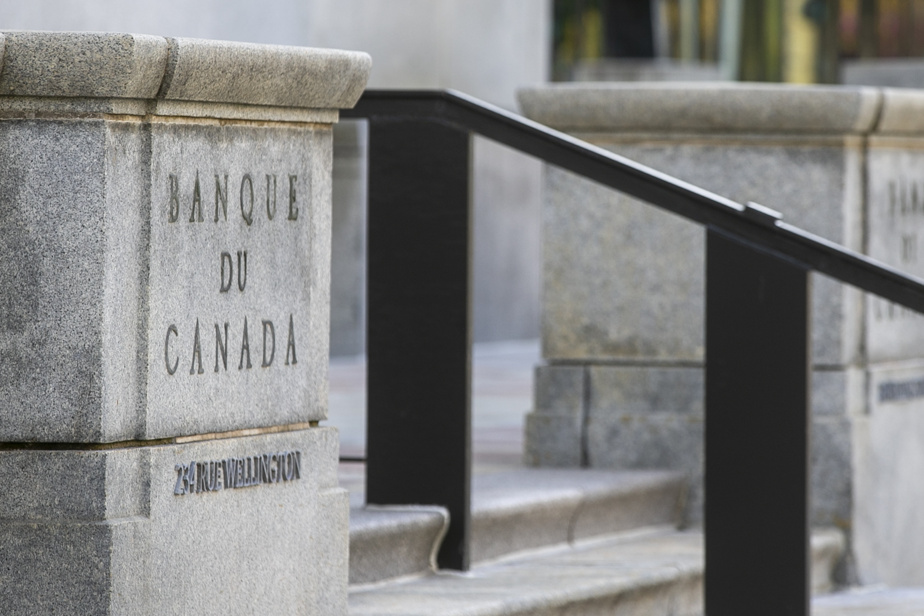
(OTTAWA) Inflation in the country appears to have peaked, but it remains high, and another significant hike in interest rates from the Bank of Canada next week is widely expected.
Posted at 4:52 pm
However, some economists expect Wednesday’s increase to be the last for a while.
“By October, we believe we will be in a comfortable enough position for the bank to assess how the economy is responding,” said Karyne Charbonneau, managing director of economics at CIBC.
September’s decision on the central bank’s key rate comes at a crucial time for the Canadian economy.
With lower gas prices, annual inflation rose to 7.6% in July from 8.1% in June. Gross domestic product (GDP) grew in the second quarter over the first three months of the year, but the pace of growth slowed towards the end of the period and the preliminary estimate points to a contraction in July. Meanwhile, the unemployment rate remains at historically low levels.
Although inflation has slowed, Bank of Canada Governor Tiff Macklem said in an August 16 opinion that high inflation, nearing a 40-year high, remains a major concern.
Inflation has eased a bit in Canada, but it is still very high. We know we still have work to do. We will not let up until inflation reaches the 2% target.
Tiff Macklem, Governor of the Bank of Canada
Some of Canada’s biggest banks expect the central bank to raise its key interest rate by three-quarters of a percentage point to 3.25% on Wednesday.
In a well-attended speech last week, US Federal Reserve Chairman Jerome Powell delivered a clear message on his own rate hike cycle, saying the Fed is likely to impose large interest rate hikes in the coming months. His message, warning that the US central bank will be aggressive on its interest rate filing, has some observers wondering if the Bank of Canada’s hike will be a full percentage point on Sept. 7.
Impact on borrowers’ families
The Bank raised its policy rate by a full percentage point in July – its biggest increase since August 1998 – continuing a string of hikes that began in March. It spent the previous two years at 0.25%, the level the bank cut it to at the start of the pandemic.
Higher interest rates increase the cost of borrowing in the economy for Canadians and businesses. By increasing the cost of borrowing, the central bank hopes to reduce spending in the economy and reduce inflation.
However, David Macdonald, an economist at the Canadian Center for Policy Alternatives, warns that rapid growth could have serious consequences given the high level of corporate and household debt in the economy.
In his latest analysis, Mr. By comparison, the last time the Bank raised interest rates was in 1995, when private sector debt stood at 142% of GDP.
This high level of debt makes it difficult to achieve the bank’s desired “soft landing”, where interest rates can raise low inflation without triggering a recession.
“What I really wanted to bring out in this analysis is that private sector debt is much higher today than it was in the 1980s (and) the 1990s and earlier years when we saw these kinds of rapid rate increases.” McDonald said. And that’s important, because it’s not just the interest rate. Interest rate is charged on something. It is billed on private sector debt. »
Will there be any solutions from the government?
Mr Macdonald called for alternative solutions to reduce inflation, which would come from the federal government rather than central bank policy.
Some of his recommendations include changing mortgage underwriting rules for investors, cooling housing prices and extending a new corporate excess profits tax beyond financial institutions.
However, Christopher Ragan of McGill University’s Max Bell School of Public Policy argues that it is better for the central bank to be responsible for keeping interest rates low.
“There are very good reasons why we should have an operationally independent central bank to target inflation rather than governments, because governments have done very poorly at this in the past,” he said.
Mr. Ragan stressed that the Bank of Canada’s independence has allowed it to operate powerfully in the face of inflation, but that any government intervention would be highly political. However, the expert admitted that reducing inflation with interest rate hikes would be painful.
“That’s why it’s so important that inflation never goes up,” Ragan said. Because not only is high inflation bad, reducing high inflation to low inflation is bad. »





